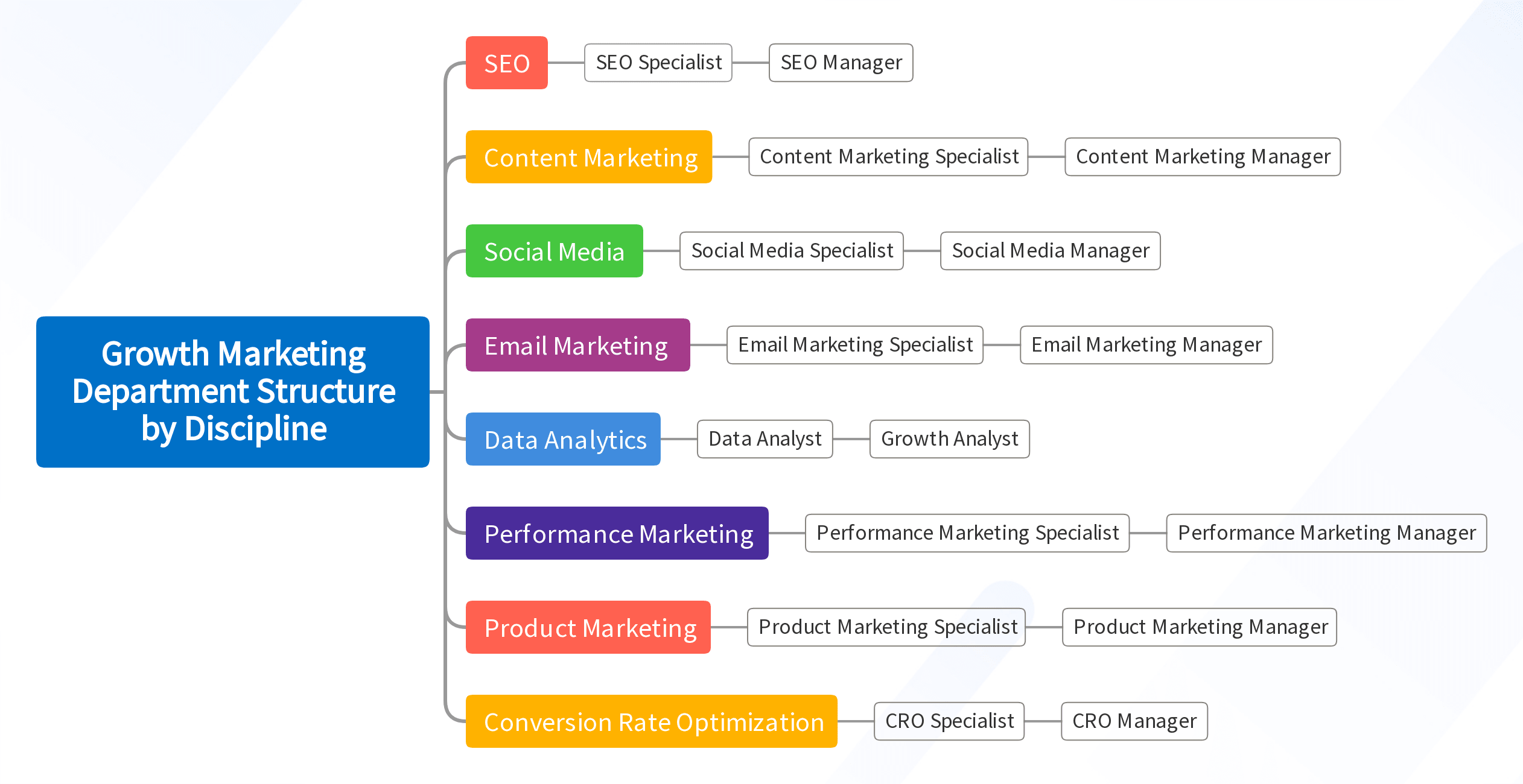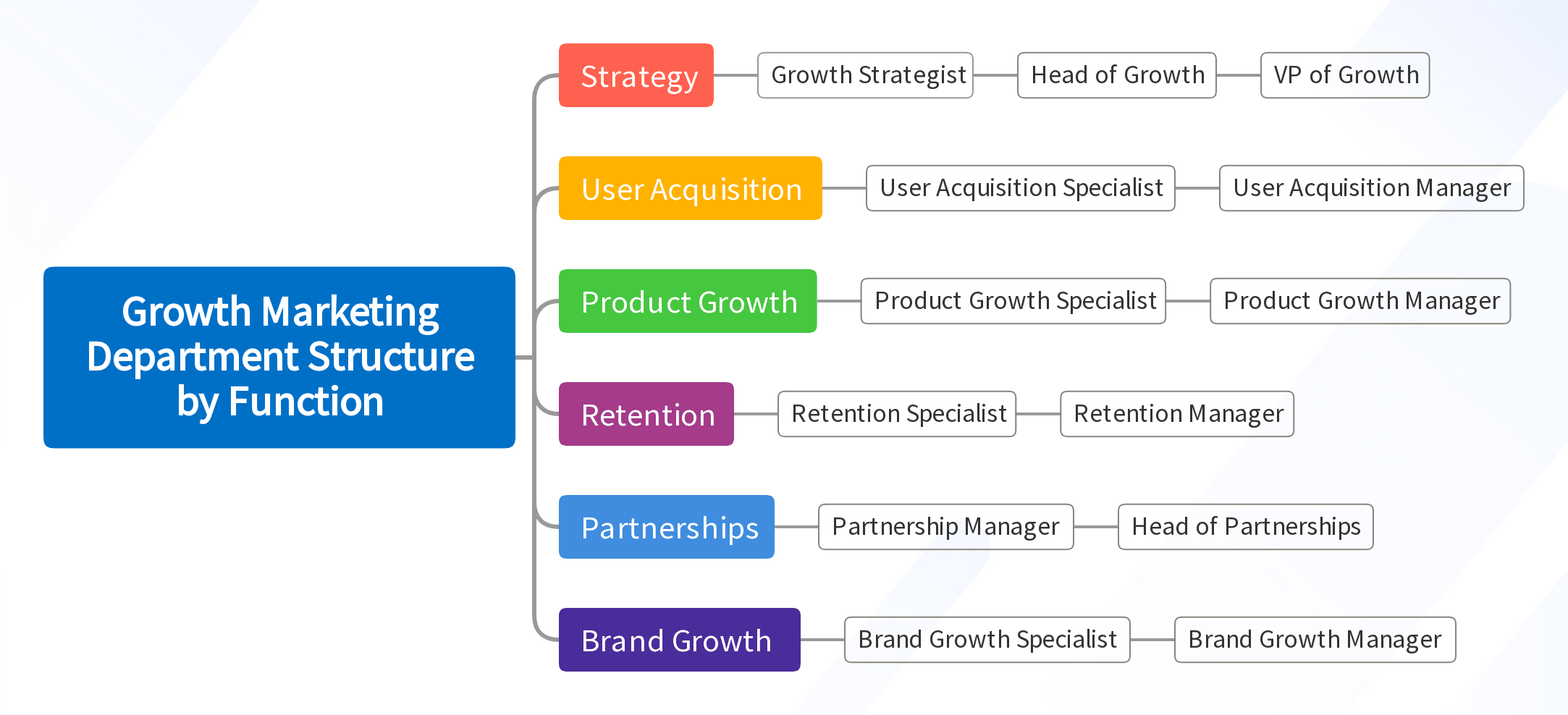

Growth Marketing teams are the unsung heroes in modern businesses. These dynamic units breathe life into companies.
They steer firms towards success in constantly shifting landscapes. Their role? Vital and transformative. I've learned this firsthand while growing my own marketing agency, GrantSpark.
But first, let's talk about the Growth Marketing department structures you have to choose from.
Best for Growth Marketers
Best for Paid Ads & CMO's
Table of Contents
Structuring Growth Marketing Department
There are two main types of department structures based on company size and resources.
- Growth Marketing department structure by discipline
- Org Type: Traditional corporate departments
- Best For: Midsize/Enterprise companies
- Growth Marketing department structure by function
- Org Type: Employees are grouped by activities and objectives
- Best For: Small to Medium Sized Business (SMB)
Let’s go in-depth to each one of them.
1. Growth Marketing Department Structure by Discipline


Discipline-based structure involves building teams centered around various marketing disciplines. For example, SEO, Content, Market Research, and Product Strategy could each form separate teams within a department.
| Discipline | Key Skills | Potential Roles |
|---|---|---|
| SEO | Keyword Research, On-page SEO, Link Building, Content Creation, SEO Analytics | SEO Specialist, SEO Manager |
| Content Marketing | Content Creation, Copywriting, Storytelling, SEO, Social Media | Content Marketing Specialist, Content Marketing Manager |
| Social Media | Content Creation, Community Management, Social Ads, Analytics, Brand Awareness | Social Media Specialist, Social Media Manager |
| Email Marketing | Segmentation, Email Design, A/B Testing, Analytics, Copywriting | Email Marketing Specialist, Email Marketing Manager |
| Data Analytics | Data Collection, Data Analysis, Reporting, A/B Testing, Data Visualization | Data Analyst, Growth Analyst |
| Performance Marketing | PPC, SEO, Social Ads, ROI Analysis, A/B Testing | Performance Marketing Specialist, Performance Marketing Manager |
| Product Marketing | Product Knowledge, Market Research, Positioning, Launching, Cross-functional Collaboration | Product Marketing Specialist, Product Marketing Manager |
| Conversion Rate Optimization | A/B Testing, User Experience, Analytics, Customer Journey Mapping, Copywriting | CRO Specialist, CRO Manager |
2. Growth Marketing Department Structure by Function


Another approach is structuring by function, where teams are formed based on the different functions they perform. For example, promotion, launches, and relationship management could all be separate teams.
| Function | Key Skills | Potential Roles |
|---|---|---|
| Strategy | Growth Mindset, Analytical Thinking, Market Research, Cross-functional Collaboration, Strategic Planning | Growth Strategist, Head of Growth, VP of Growth |
| User Acquisition | Customer Acquisition Strategies, Performance Marketing, A/B Testing, Networking, Lead Generation | User Acquisition Specialist, User Acquisition Manager |
| Product Growth | Product Development, UX/UI Design, A/B Testing, Data Analysis, User Research | Product Growth Specialist, Product Growth Manager |
| Retention | Customer Relationship Management, Email Marketing, Loyalty Programs, Analytics, Communication Skills | Retention Specialist, Retention Manager |
| Partnerships | Relationship Management, Networking, Sales, Negotiation, Strategic Planning | Partnership Manager, Head of Partnerships |
| Brand Growth | Brand Management, Creative Thinking, Brand Strategy, Market Research, Public Relations | Brand Growth Specialist, Brand Growth Manager |
Growth Marketing Team Size versus Business Scale
To achieve successful marketing outcomes, you need to align the team size with your business's scale – a strategic approach that helps optimize resources and drive targeted growth.
| Business Scale | Ideal Department Size | Explanation |
|---|---|---|
| Start-up | 1-3 | Minimize costs, encourage fast decision-making and flexibility. |
| Small-Medium Business | 4-8 | Allows for specialized roles, while maintaining cost-efficiency. |
| Large Enterprise | 9+ | Large scope and complexities require a larger, diversified team. |
Factors to Consider When Deciding On a Growth Marketing Department Structure
- Company Size: The scale of your business can impact the structure of your growth marketing team. Larger companies may need a more extensive team with specialized roles, while smaller businesses might require a leaner team with broader skillsets.
- Business Goals: Your organization's objectives should shape your growth marketing team. If your goal is to penetrate new markets, for example, you might need team members with international marketing experience.
- Industry Type: The nature of your industry can influence the team structure. For instance, B2B companies might need a different marketing approach than B2C businesses, thus requiring different team compositions.
- Available Budget: The funds allocated towards marketing efforts can determine the size and structure of your team. A larger budget may allow for more specialized roles, while a smaller one may necessitate a more generalist approach.
- Company Culture: Your organizational culture can affect the way your team is structured. A company that values innovation might benefit from a more flexible, cross-functional team, while a more traditional company might prefer a classic, hierarchical team structure.
Explore other marketing departments:
So, there you have it, a detailed overview of a Growth Marketing team structure. From the essence of the team and key roles, to structuring and optimizing; every aspect tailored to achieve success on your business blueprint.




















